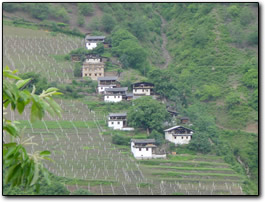
Deqin to Cizhong
From Zhongdian we took a bus to Deqin, a small town in the mountains near the Tibetan border. The long ride gave us our first chance to watch Sino-Tibetan music videos on the bus TV. The ktisch videos sang about Shangri-la while showing pictures of the Lhasa, the Potala and yaks as Tibetan and Chinese characters scrolled across the bottom of the screen. The bus wheezed through cloud forest, then onto a rough dirt road before climbing over a snowy pass. Although the weather was miserable, the area looked great for hiking. We originally intended to head straight for Kawa Karpo, an impressive 6700m peak on the Tibetan border.
 |
 |
With the heavy rain and poor visibility, we decided instead to take a bus down the Mekong to Cizhong, a town in a Catholic wine-growing area. The route, about 80km, took more than five hours. The road ran along the gorge of the Mekong, sometimes climbing as high as 1000m above the river to wind through the countryside. Whitewashed Tibetan houses perched on the hillsides below in impossible locations. In one place the road was washed out. We were asked to dismount and walk across the muddy track cut through the landslide in case the bus slipped and crashed into the abyss.
 |
 |
Along the way were camps where manual laborers worked to improve the road. They built reinforcing walls and resurfaced the road by laying down large rocks one by one, cutting and hauling them by hand. Below, the dirty brown Mekong (known in these parts as the Lancang Jiang) raged through bends and rapids. In some places the hills were covered with only scrubby bushes. Around the next corner, however, would be thick forest dripping with moss. With the tops of the mountains lost in the clouds, the landscape appeared eerie and mysterious. When we finally stumbled off the bus in Cizhong, we spied the strange, Tibetan-style Catholic church across the river.
 |
 |
As we approached town, huddling to keep ourselves dry in the dripping rain, we noticed that all of the fields were planted with grapes. Next to the church was a sign that said “wine tasting”. Luckily, we had met two other travelers from the guesthouse in Zhongdian, one of whom could speak Chinese. She talked to Liu, the man who ran the place, and we sat down in his salon and sipped some of his red wine under colorful posters of Jesus and the Virgin Mary. The wine was sweet and not very strong, more like slightly fermented grape juice. Unfortunately the only remaining French speaker in town had died last year.
The rain let up, so we decided to have a walk around town. People stared at us as we passed before their houses. A man living down the road invited us into his place. He served us some better wine and showed us the large clay jars that he used to store it. While we sat in his salon drinking, he took out a book. It was written in French, about a Catholic Missionary from Switzerland who had been martyred in the area while trying to convert the local people to Christianity. The missionary, Tornay, who was beaten to death by Tibetan monks at a lonely pass in 1949, was born in St Maurice, the same place as Anne. She pointed to the black-and-white picture in the book and tried to explain in sign language that she was from there. Our host’s eyes lit up. He was genuinely excited to meet someone from Switzerland!
